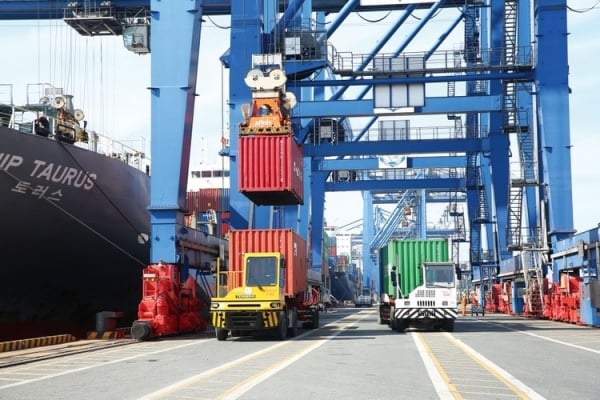As a result, surging U.S. oil exports have turned Corpus Christi into the world’s third-largest crude oil export port. U.S. Gulf Coast ports are shipping large volumes of U.S. energy to international markets, including crude oil, fuels, and liquefied natural gas (LNG).
The Port of Corpus Christi recently reported record volumes of cargo moving through the Corpus Christi Channel, thanks to a surge in crude oil exports. The port currently handles more than half of all U.S. crude oil exports and is also the top LNG export destination. To meet the growing demand, Corpus Christi is expanding and deepening the channel to accommodate very large crude carriers (VLCCs) and increase cargo traffic, with the goal of “moving America’s energy,” port officials said.
 |
| The Port of Corpus Christi has become the world's third-largest crude oil export gateway, handling more than half of U.S. crude and is expanding its infrastructure. |
Total U.S. crude oil exports have soared to more than 4 million barrels per day (bpd) this year, up from just 400,000 bpd before the Obama administration lifted the ban on U.S. crude oil exports in 2015, according to data from the U.S. Energy Information Administration (EIA). Before 2016, U.S. crude oil was exported only to Canada. After the ban was lifted, U.S. crude oil was allowed to reach international markets, and has since become a major commodity in the global oil market.
A surge in crude oil exports, particularly WTI Midland, has dominated the global market in recent months, with record volumes exported, a significant portion of which has been sent to Europe. Since then, US exports have surged following the government’s decision to allow crude oil exports, coupled with midstream operators seizing the opportunity to build pipelines in Texas and Louisiana, leading to the creation of export terminals on the US Gulf Coast.
U.S. crude is so influential that WTI Midland was added to the Dated Brent portion of the Brent benchmark last year, becoming one of the base grades for the contract, according to experts. The port of Corpus Christi has played a key role in helping U.S. crude gain international prominence. It currently exports between 2.3 million and 2.4 million barrels per day, 99 percent of which goes to international markets.
Corpus Christi’s crude oil exports have jumped 17-fold since the U.S. lifted its export ban, TJ Gonzalez, the port’s director of business and trade development, said this month. “That’s why we’re known as the No. 3 crude oil export gateway in the world,” he said.
Currently, Corpus Christi is only behind the Ras Tanura port in Saudi Arabia and the Basrah oil export port in Iraq. Specifically, Ras Tanura, the largest port in the world's leading crude oil exporter, Saudi Arabia, has the capacity to transport 6.5 million barrels of crude oil per day, equivalent to 7% of global oil demand. The Ras Tanura port on the east coast of the Kingdom also has the capacity to transport a total of 9 million barrels of hydrocarbons per day. Meanwhile, in Iraq, Al Basrah Oil Port has the capacity to export more than 3.2 million barrels per day, making it the second largest oil export facility in the world.
Last week, the Port of Corpus Christi reported record volumes for the third quarter, up 2% year over year, marking the highest quarter in the port’s history. The port saw crude oil shipments increase 3% year over year, along with “slight increases in refined products, liquefied natural gas, and dry bulk volumes.”
Crude oil volumes moved higher in the first nine months of 2024, as customers shipped 2.4 million barrels per day, up from 2.3 million barrels per day in the same period in 2023. “Through continued investments in maritime infrastructure, the Port of Corpus Christi and its strong customer base remain well-positioned for future growth,” said Kent Britton, CEO of the Port of Corpus Christi.
Port officials expect the fourth and final phase of the Corpus Christi Channel Improvement Project to be completed in early 2025. Once completed, the Coastal Bend will feature the most improved waterway on the Gulf Coast from Texas to Florida, with a deeper (average low water of 54 feet) and wider (530 feet) channel.
The project will reduce travel time from the inner port to deep water to about two hours, compared to eight hours or more at other U.S. Gulf Coast ports, Gonzalez said. “Shipping agents can take ships into deep water and take them out to their next destination faster.”
The Port of Corpus Christi is demonstrating its strength and vital role in the global crude oil export industry, further cementing its position as one of the world's leading ports.
https://oilprice.com/Energy/Crude-Oil/Corpus-Christi-Is-Now-The-Worlds-Third-Largest-Oil-Export-Port.html
Source: https://congthuong.vn/cang-corpus-christi-cua-ngo-xuat-khau-dau-tho-hang-dau-the-gioi-cua-hoa-ky-354216.html


![[Photo] Closing of the 11th Conference of the 13th Central Committee of the Communist Party of Vietnam](https://vstatic.vietnam.vn/vietnam/resource/IMAGE/2025/4/12/114b57fe6e9b4814a5ddfacf6dfe5b7f)


![[Photo] Overcoming all difficulties, speeding up construction progress of Hoa Binh Hydropower Plant Expansion Project](https://vstatic.vietnam.vn/vietnam/resource/IMAGE/2025/4/12/bff04b551e98484c84d74c8faa3526e0)

























































































Comment (0)